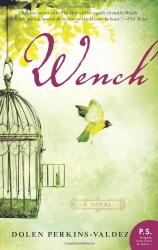Wench
Review
Wench
Lizzie might be Drayle’s mistress with regards to her position in his marriage, but she’s certainly not the mistress. No, Lizzie is a slave and in the precarious position of being the educated mother of her master’s only children. But she learns that the complicated relationship she has with Drayle can affect how she looks at freedom and at other slaves. Each summer, the two vacation to Tawawa House, a resort in Ohio where Lizzie befriends Sweet, Reenie and Mawu, other slaves who have ongoing “affairs” with their masters.
Tawawa House is not just a vacation for the white men. The slave mistresses also enjoy the privilege of working less and being away from their plantations, where, again, they live not too shabby lives compared to the rest of the slaves. Lizzie is a house slave; she has a bedroom in Drayle’s house, and she and her two children all know how to read and write. That makes it harder for her to identify with other slaves, so Tawawa House is a welcome respite where Lizzie can make friends who also have close and complicated relationships with their masters.
The four women spend their time together doing chores, brushing each other’s hair and gossiping. Knowing that they are in a free state, they discuss running away, and their relationship with Lizzie changes when she tells Drayle that Mawu is going to run. Convinced that telling is in Mawu’s best interest, Lizzie tattles not only to “save” her friend but also because she is attached to Drayle and wants to gain his trust so he can free their children. When Mawu is caught and brought back to Tawawa House, Lizzie knows that things will never be the same.
Cut to part two, where we skip back in time to see Lizzie’s life on the plantation and the beginning of her and Drayle’s relationship. Soon after puberty, Lizzie begins to see him looking in on her while she sleeps, and things quickly progress to her first pregnancy. Drayle’s wife, who has no children of her own, alternately hates and dotes on Lizzie’s children, at one point even calling them her own. The Drayle household becomes the home of a love triangle --- or a pentagon.
The next time we return to Tawawa House, it’s a new summer and Drayle’s wife has come along on the trip. The air is changing; the friendships have matured and in some cases over-ripened. More northerners are vacationing at the resort, and they aren’t sure how to view these slave women who aren’t quite free but enjoy freedoms not given to field slaves.
There are plenty of narratives, both fiction and nonfiction, detailing this dark time in American history. But slavery is not something we should forget, and Dolen Perkins-Valdez looks at this issue more from a psychological standpoint than merely from a historical one. The characters here feel real; they aren’t there just to teach us a history lesson.
What’s more, the novel doesn’t read like dry historical fiction. The fact that you can understand what Lizzie, Reenie and others are saying makes it easier to identify with the human parts of their story. We may not be slaves or slave owners anymore, but people today still experience unfaithful marriages and abusive relationships. It’s unnerving but identifiable to see how Lizzie can love a man who can also whip her or sell her at any time. Perkins-Valdez is also bringing to life a place that actually did exist, adding another real element to the fiction.
WENCH is literary fiction with a faster pace, historical fiction that a modern reader can understand, and a psychological examination of a terrible practice. Anyone will be able to appreciate this great read.
Reviewed by Sarah Hannah Gómez on January 24, 2011
Wench
- Publication Date: January 25, 2011
- Genres: Fiction, Historical Fiction
- Paperback: 320 pages
- Publisher: Amistad
- ISBN-10: 0061706566
- ISBN-13: 9780061706561




